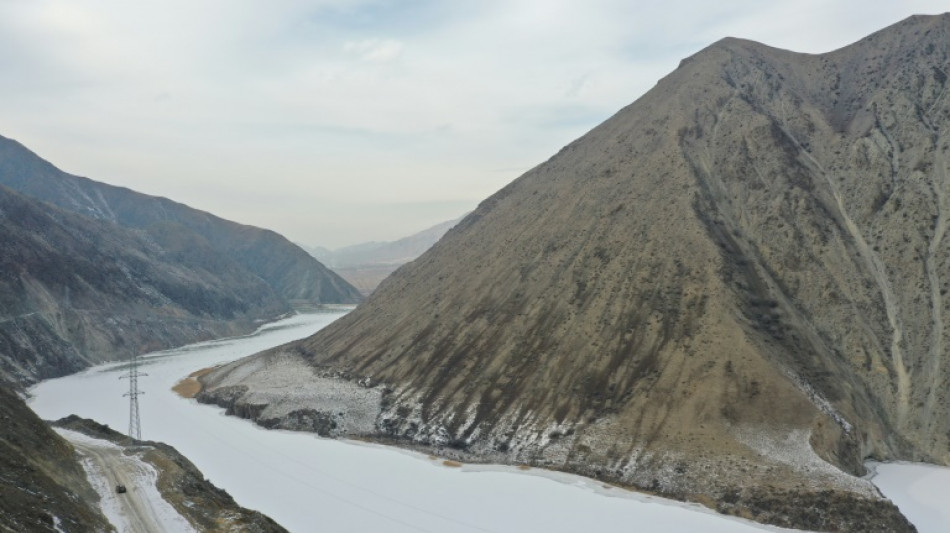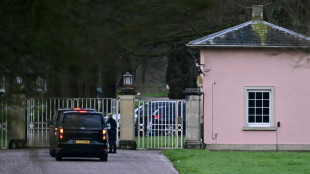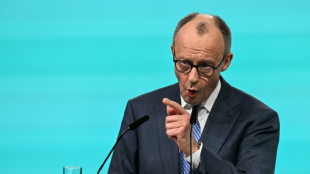
-
 Trump vows 10% global tariff after stinging court rebuke
Trump vows 10% global tariff after stinging court rebuke
-
Aston Martin in disarray as Leclerc tops F1 testing timesheets

-
 Venus Williams accepts Indian Wells wild card
Venus Williams accepts Indian Wells wild card
-
Anxious Venezuelans seek clarity on new amnesty law

-
 Last-gasp Canada edge Finland to reach Olympic men's ice hockey final
Last-gasp Canada edge Finland to reach Olympic men's ice hockey final
-
Scotland captain Tuipulotu grateful for Wales boss Tandy's influence

-
 Zelensky says no 'family day' in rare personal interview to AFP
Zelensky says no 'family day' in rare personal interview to AFP
-
Zelensky tells AFP that Ukraine is not losing the war

-
 Sweden to play Switzerland in Olympic women's curling final
Sweden to play Switzerland in Olympic women's curling final
-
Counting the cost: Minnesota reels after anti-migrant 'occupation'

-
 UK police probe Andrew's protection as royals reel from ex-prince's arrest
UK police probe Andrew's protection as royals reel from ex-prince's arrest
-
Doris says Ireland must pile pressure on England rising star Pollock

-
 US military assets in the Middle East
US military assets in the Middle East
-
Neymar hints at possible retirement after World Cup

-
 Stocks rise after court ruling against US tariffs
Stocks rise after court ruling against US tariffs
-
Australia end dismal T20 World Cup by thrashing Oman

-
 Olympics chief says Milan-Cortina has set new path for Games
Olympics chief says Milan-Cortina has set new path for Games
-
Russian SVR spy agency took over Wagner 'influence' ops in Africa: report

-
 Pegula fights back to sink Anisimova and reach Dubai final
Pegula fights back to sink Anisimova and reach Dubai final
-
Trump administration denounces 'terrorism' in France after activist's killing

-
 Colombia's Medellin builds mega-prison inspired by El Salvador's CECOT
Colombia's Medellin builds mega-prison inspired by El Salvador's CECOT
-
German broadcaster recalls correspondent over AI-generated images

-
 US Supreme Court strikes down swath of Trump global tariffs
US Supreme Court strikes down swath of Trump global tariffs
-
England's Itoje says managing 'emotional turmoil' key to 100 cap landmark

-
 Trump says weighing strike on Iran as Tehran says draft deal coming soon
Trump says weighing strike on Iran as Tehran says draft deal coming soon
-
Tudor is '100 percent' certain of saving Spurs from relegation

-
 Azam dropped for scoring too slowly, says Pakistan coach Hesson
Azam dropped for scoring too slowly, says Pakistan coach Hesson
-
Stocks volatile after soft US growth data, court ruling against tariffs

-
 Italy bring back Capuozzo for France Six Nations trip
Italy bring back Capuozzo for France Six Nations trip
-
From Malinin's collapse to Liu's triumph: Top Olympic figure skating moments

-
 Arteta urges Arsenal to 'write own destiny' after title wobble
Arteta urges Arsenal to 'write own destiny' after title wobble
-
Ukraine Paralympics team to boycott opening ceremony over Russian flag decision

-
 Wales captain Lake wants fans to bring 'noise' against Scotland
Wales captain Lake wants fans to bring 'noise' against Scotland
-
Skier Vonn's Italian hospital a hotbed of men, sister says

-
 India target S.Africa top order, Abhishek to come good: bowling coach
India target S.Africa top order, Abhishek to come good: bowling coach
-
Carrick praises Man Utd 'diversity' after Ratcliffe's immigrant rant

-
 I never thought it would be hit, says 'Scream' creator 30 years later
I never thought it would be hit, says 'Scream' creator 30 years later
-
AI summit statement delayed to 'maximise' signatories: India

-
 Barcelona's Sagrada Familia basilica hits peak height
Barcelona's Sagrada Familia basilica hits peak height
-
Milan sprints to second straight UAE stage win as Tiberi keeps lead

-
 US GDP growth misses expectations as Trump blames shutdown
US GDP growth misses expectations as Trump blames shutdown
-
Benfica investigate video of fans' monkey gestures

-
 French minister pledges tight security at rally for killed activist
French minister pledges tight security at rally for killed activist
-
Guardiola 'couldn't care less' about Arsenal stumble in title race

-
 UK police search property as royals reel from Andrew's arrest
UK police search property as royals reel from Andrew's arrest
-
Germany's Merz to visit China next week

-
 Kompany says Mourinho made 'huge mistake' in Vinicius racism row
Kompany says Mourinho made 'huge mistake' in Vinicius racism row
-
X appeals EU's 120-mn-euro fine over digital content violations

-
 Galthie recalls hulking locks Flament, Meafou for Italy
Galthie recalls hulking locks Flament, Meafou for Italy
-
Turkey, Saudi sign major solar power deal


Climate crisis revives Soviet hydro plan in Central Asia
Central Asian countries are setting rivalries aside to build a giant hydroelectric plant originally planned in Soviet times, a bid to strengthen energy and food security and mitigate the effects of climate change.
The Kambar-Ata-1 project on the Naryn River in Kyrgyzstan is a rare example of collaboration in the region that does not involve the two neighbouring superpowers Russia and China.
The plant is "very important for Central Asia", Kyrgyz Energy Minister Taalaibek Ibrayev said on a visit to the future site attended by AFP.
At a trilateral meeting with Kyrgyzstan a few days later, the Kazakh and Uzbek governments said the project would "bring great advantages for the region" and "ensure the long-term stability and development of Central Asia".
The warm words, which would have been unthinkable until recently, underscore how water and energy shortages are pushing rivals together.
But before the plant can start functioning, backers need to find investors willing to put in at least $3.5 billion.
- 'Wealth of potential' -
The post-Soviet economic collapse, corruption and regional conflicts put an end to colossal energy projects in Central Asia including Kambar-Ata, which had been planned in 1986.
"The collapse of the Soviet Union destroyed water and energy ties," said Rasul Umbetaliyev, a Kyrgyz energy expert.
Since Soviet times, Kyrgyzstan and Tajikistan are supposed to receive some electricity from their regional neighbours Kazakhstan, Turkmenistan and Uzbekistan in exchange for a share of their plentiful water supplies.
The different countries have accused one another of failing to respect the arrangement.
Umbetaliyev said that Kambar-Ata-1 was "very important" for Kazakhstan and Uzbekistan, which need the water stored by the plant in large quantities during the summer season.
The plant would allow Kyrgyzstan to export electricity to its neighbours, and even to Afghanistan and Pakistan under project known as CASA-1000.
The World Bank says Kyrgyzstan's mountainous terrain "provides it with a wealth of hydropower potential, less than one-fifth of which has been utilised".
Kambar-Ata is expected to produce 5.6 billion kilowatt-hours (kWh), which would more than make up for Kyrgyzstan's current electricity deficit of around 3.9 billion kWh.
The deficit is growing because of water shortages that mean the hydroelectric stations that Kyrgyzstan depends on are running low.
The Eurasian Development Bank said that "building new hydroelectric power stations while renovating existing ones will mitigate the impact of climate change".
- Costly subsidies -
The Kyrgyz government is also expecting Kambar-Ata-1 to have a positive effect on power stations further downstream.
The main one is Toktogul, which supplies 40 percent of Kyrgyzstan's electricity.
Pride of place inside the Toktogul power station is a large frieze showing Soviet leader Vladimir Lenin and his quote: "Communism is Soviet power and the electrification of the whole country".
A century later, the sector is still largely subsidised by the state, as it was in Soviet times, to avoid social tensions in a fragile economy.
"Today the tariff we sell at is not justified by the costs of production of electricity. If we continue like this, in five or 10 years, we will have no more electricity. We therefore have to build a plant," Ibrayev said.
aj-bk/dt/js
B.Finley--AMWN


